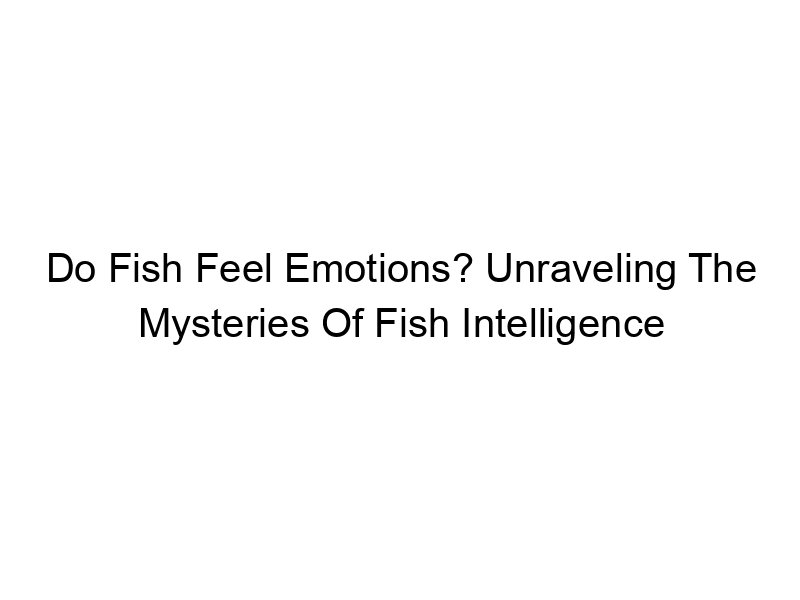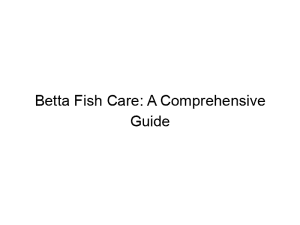Have you ever watched a fish darting through a coral reef, or a school of fish moving in perfect unison? It’s easy to assume they’re simply reacting to stimuli, but the reality is far more complex. Do Fish Have Feelings? Exploring Fish Intelligence is a fascinating field that challenges our assumptions about animal consciousness. This article will delve into the latest scientific research, exploring fish cognition, emotions, social behaviors, and their surprising levels of intelligence. We’ll examine what makes them tick, their capacity for learning and problem-solving, and how their behavior challenges our simplistic views of the animal kingdom. Get ready to be surprised by the intricate world of fish intelligence and emotion.
Fish cognition refers to the mental processes of fish, including perception, learning, memory, problem-solving, and social interactions. It’s
a broad field encompassing how fish process information from their environment and use it to make decisions. Unlike the simplistic view that fish are purely instinct-driven, research shows a remarkable capacity for complex behaviors and learned responses.
The Neurological Basis of Fish Intelligence
While fish brains are structurally different from mammalian brains, they possess complex structures capable of sophisticated cognitive functions. Specific brain regions are involved in processing sensory information, spatial navigation, and social interactions. The size and complexity of the brain vary greatly across species, with some exhibiting significantly more advanced cognitive abilities than others.
Measuring Fish Intelligence: Challenges and Methods
Assessing fish intelligence presents unique challenges. We can’t directly ask them questions, and their communication methods differ greatly from our own. Scientists use various methods, including behavioral observations in controlled environments, maze tests to assess spatial learning, and studies of social interactions to gain insights into their cognitive capabilities.
Do Fish Experience Emotions? Evidence and Debate
The Science of Fish Emotions
The question of whether fish experience emotions is a complex one that has been vigorously debated. While we can’t definitively know their subjective experience, there’s mounting evidence suggesting they do feel things, albeit in ways that may differ from human emotional experiences. This evidence comes from studying their behavioral responses to various stimuli and examining physiological changes associated with those responses.
Behavioral Indicators of Emotions in Fish
Researchers observe several behavioral indicators that suggest emotional responses in fish. These include changes in activity levels, coloration, body posture, and social interactions. For example, a fish exhibiting stressed behavior might show rapid gill movements, changes in swimming patterns, or a darkening of its skin. Conversely, relaxed fish might display more leisurely swimming and a brighter coloration.
Physiological Responses and Emotional States
Studies have also shown that fish exhibit physiological changes, such as altered hormone levels, in response to environmental stressors or social interactions. These physiological responses align with what we might expect to see in animals experiencing fear, anxiety, or stress. For instance, elevated cortisol levels (a stress hormone) have been documented in fish exposed to harsh environments or aggressive conspecifics.
Social Behavior and Intelligence in Fish
Social Structures and Group Dynamics
Many fish species live in complex social groups, demonstrating sophisticated social structures and dynamics. These social structures are maintained through communication, cooperation, and competition. For example, some fish species exhibit hierarchical systems, with dominant individuals controlling access to resources.
Communication and Cooperation in Fish Schools
Schooling fish demonstrate impressive levels of coordination and cooperation. They use various mechanisms, including visual cues, lateral line systems, and chemical signals, to maintain cohesion and avoid predators. The coordination within a school suggests a level of individual awareness and collective decision-making.
Aggressive Behavior and Territoriality in Fish
While cooperation is crucial in some contexts, aggression and territoriality are also common among fish. Competition for resources, mates, and breeding sites can lead to aggressive interactions. These interactions often involve displays of threat, physical attacks, and establishment of dominance hierarchies.
Learning and Problem-Solving in Fish
Evidence of Learning in Fish
Numerous studies show that fish are capable of various forms of learning, including classical conditioning (associating a stimulus with a reward or punishment) and operant conditioning (learning through trial and error). For example, fish can be trained to associate a specific sound with food, leading them to anticipate feeding times.
Spatial Learning and Navigation in Fish
Many fish demonstrate remarkable spatial learning and navigation skills. They can remember the locations of food sources, shelters, and other important features in their environment. Some fish species use landmark navigation, while others appear to use more complex cognitive maps.
Tool Use and Problem-Solving in Fish
Although less common than in some other animals, there’s evidence of tool use and problem-solving in certain fish species. For example, some fish have been observed using tools to access food or build nests. This suggests a level of cognitive flexibility and adaptability.
Different Types of Fish and Their Intelligence
Comparing Cognitive Abilities Across Species
It’s crucial to remember that fish intelligence varies greatly depending on the species. Some species exhibit more advanced cognitive abilities than others, reflecting differences in brain size, social complexity, and ecological demands. Certain species, like wrasses, have demonstrated exceptional memory and learning capabilities.
Examples of Highly Intelligent Fish Species
Several fish species stand out for their impressive cognitive skills. Examples include cichlids (known for their complex social structures and parental care), pufferfish (capable of building intricate nests), and cleaner wrasse (demonstrating advanced social intelligence and cooperation).
Factors Affecting Fish Intelligence
Several factors influence a fish’s cognitive abilities. These include brain size and structure, social environment, ecological pressures, and genetic factors. Fish living in complex social groups or challenging environments tend to exhibit more developed cognitive skills.
The Ethical Implications of Understanding Fish Intelligence
Re-evaluating Our Treatment of Fish
The growing understanding of fish intelligence and emotional capacities has significant ethical implications. It challenges our anthropocentric views and highlights the need for responsible treatment of fish in aquaculture, fisheries, and the pet trade. We need to reconsider practices that cause unnecessary suffering.
Conservation and Welfare of Fish
Protecting fish populations and their habitats is vital for maintaining biodiversity and ecosystem health. Furthermore, understanding their cognitive and emotional lives calls for a heightened awareness of their welfare, minimizing stress and promoting appropriate living conditions.
The Future of Fish Research
Further research is needed to fully understand the complexity of fish cognition and behavior. Advanced techniques in neurobiology and behavioral analysis will help shed more light on their inner lives, influencing our ethical responsibilities and our stewardship of aquatic environments.
Fish Intelligence and Human Activities
Impact of Fishing Practices on Fish Behavior
Fishing practices, including destructive methods like bottom trawling, can significantly impact fish behavior, population dynamics, and overall ecosystem health. The stress associated with these practices can cause long-term harm to fish populations.
Pollution and its Effect on Fish Cognition
Pollution from various sources can negatively impact fish cognition and behavior. Exposure to toxins can impair their sensory systems, learning abilities, and even reproductive success. Clean water is essential for maintaining healthy fish populations and ecosystems.
Climate Change and Fish Intelligence
Climate change poses a major threat to fish populations and their habitats. Changes in water temperature, acidity, and oxygen levels can directly affect fish physiology, behavior, and cognitive function, potentially leading to population decline and ecosystem disruption.
Frequently Asked Questions
What is the significance of studying fish intelligence?
Studying fish intelligence broadens our understanding of animal cognition, challenging anthropocentric views and highlighting the complexity of animal behavior. It impacts conservation efforts, ethical considerations in aquaculture and fisheries, and our understanding of the natural world.
Do all fish species exhibit the same level of intelligence?
No. Fish intelligence varies significantly across species. Factors such as brain size, social complexity, and environmental demands contribute to differences in cognitive abilities. Some species demonstrate remarkable problem-solving skills, while others exhibit more basic cognitive functions.
How do scientists study fish emotions?
Scientists study fish emotions by observing behavioral indicators (e.g., changes in activity levels, coloration, body posture) and measuring physiological responses (e.g., hormone levels) to various stimuli. This allows researchers to infer potential emotional states based on observable changes.
Can fish experience pain?
There’s growing evidence to suggest that fish can experience pain, although the precise nature of their pain experience is still being investigated. Studies show that fish react to noxious stimuli with avoidance behaviors and physiological changes consistent with pain responses in other animals.
What are the implications for the aquarium trade?
Understanding fish intelligence has implications for the aquarium trade, suggesting the need for providing enriched environments that meet the cognitive and social needs of different species. This includes providing adequate space, proper water conditions, and social interaction opportunities.
Final Thoughts
The exploration of fish intelligence has revolutionized our understanding of the animal kingdom. We’ve moved beyond a simplistic view of fish as mere automatons to recognizing their surprising cognitive abilities, capacity for learning, and potential for experiencing a range of emotions. This profound shift necessitates a reassessment of our relationship with these creatures and a renewed focus on responsible conservation and ethical treatment. From responsible fishing practices to advocating for cleaner waters and combating climate change, our actions have a direct impact on the lives and well-being of these fascinating aquatic inhabitants. Let us continue to explore the mysteries of the underwater world and strive to protect these intelligent and sentient beings for future generations. Let’s work together to ensure a sustainable future for our oceans and their diverse inhabitants.




